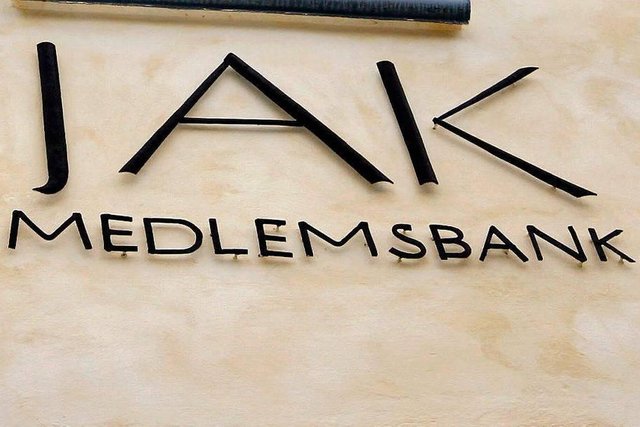JAK Medlemsbank - bank without interest
Most of us know that the bank is a financial and credit organization, a usurer legalized by the state, which was created with the purpose of making profit for its owners, with the help of its main "weapon" - loan interest.
And we are used to the fact that there are no interest-free loans, and that banks with their interest-bearing money are an obligatory, and almost the main, component of the entire economic system, and not one state, no society, not one human.
Can a bank function as a non-profit organization? And can he work exclusively in the interests of people?
Today I want to tell you about an unusual bank whose members refused to participate in this crazy race of exponential growth of money, and stand on the principles of an interest-free economy.
The Swedish bank "JAK Medlemsbank" is a bank created in the form of a cooperative, that is, all its participants are its owners, on the basis of their cash shares contributed to the common fund.
The bank does not set itself the traditional and primary goal of each financial institution - profit making, but serves only the interests of its participants, providing them with interest-free loans if necessary.
The main principle feature of this bank is that its members are convinced that the loan interest is an evil that destabilizes the economy, leads to disproportion in its various spheres and deepens inequality between people, making the rich even richer, and the poor are poorer.
The history of the "JAK Medlemsbank" is as follows.
In 1931, at the height of the economic depression, the JAK cooperative was founded inDenmark (from Jord Arbete Kapital, or "Land-Labor Capital"). Its founders were inspired by the ideas of the German economist Silvio Gesell, who argued that money should be used only as an instrument of exchange (a measure of value and a means of exchange), and at the same time be "free of interest."
They boldly got down to business, and, united in a cooperative, introduced their own currency. But this did not please the state, and in 1933 it banned their activities. Then the participants organized a savings-loan non-interest-bearing cooperative on the basis of mutual exchange. This also did not suit the state, and since 1934 it has added JAK to the financial system of Denmark on general grounds.
But the ideas and experience of the Danes were not wasted, and in 1965 their co-owners, in Sweden, founded JAK Medlemsbank. His motto is "Together we have a bank!"
So, where do you get and give money to someone if they do not already exist? In traditional banking, the source of initial capital is owners and shareholders. In our case, they themselves are the people who unite, contribute their free money, and get the opportunity to receive them when they need them.
To ensure the activities of the cooperative, a group of activists from Riksforening for Ekonomisk Frigorelse (the "National Association for Economic Liberation") developed a mathematically correct system of loans and savings based on a system of savings and loan "points."
How does it work?
By investing money in a cooperative, a member of the cooperative earns, in due course, savings "points" that depend on the amount of the deposit and the time of its storage - the longer the term of the deposit, the more points the depositor receives. When a person accumulates enough savings "points", he can use them by requesting a loan from the bank.
In other words, if 10 points are given for the accumulation of 100 euros within a year (without exceptions), then the loan can be received only for 100 euros, which must be given within a year. This is done to maintain a balance between the amount of savings and loans issued. If the required loan amount is more than the amount of accumulated points, the member of the bank will have to continue to accumulate points after repaying the loan while continuing to keep money in the circulation of the JAK-bank. This is done to maintain a balance between the amount of savings and loans issued - in this way, after the end of the loan period and its return, all savings points will be equal to all loan scores.
The bank is managed by a board of directors, elected annually by all members of the bank, but directors are not allowed to have more than one share.
Since the bank is a non-profit institution, all administrative and operational expenditure of its activities are provided at the expense of membership fees, and fees for consideration of applications, and their total size is about 2.5% of the inserted amount.
The bank operates only in Sweden, therefore contributions are accepted and issued in Swedish kroons, and only to Swedish citizens. All participants are insured savings guarantees the Swedish banking system since the 1999 financial Swedish Department finally issued AK Medlemsbank banking license. Not striving for active development, for the expansion of its activities the bank uses only the recommendations of its participants on the basis of personal communication, so the bank grows slowly and today has about 70,000 members.
So, we see that people united by certain values can create their own peculiar "financial system, a system of distribution of monetary resources that is independent of traditional ideas and serves their interests, where the main result is not profit, but profit, good, satisfaction of needs and needs of people.
My original: https://golos.io/ru--denxgi/@alekst/jak-medlemsbank-bank-bez-procentov
Thank you for attention.

Congratulations @alekst! You have completed some achievement on Steemit and have been rewarded with new badge(s) :
Click on any badge to view your own Board of Honor on SteemitBoard.
For more information about SteemitBoard, click here
If you no longer want to receive notifications, reply to this comment with the word
STOP